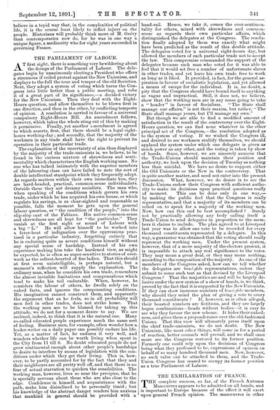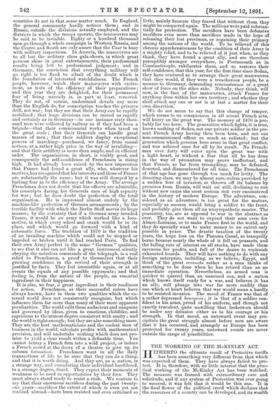THE EXHILARATION OF FRANCE. T HE complete success, so far, of
the French Autumn Manceuvres appears to be admitted on all hands, and is important to Europe because of the effect it will exert upon general French opinion. The manoeuvres in other countries do not in that sense matter much. In England, the general community hardly notices them ; and in Russia, outside the divisions actually employed, and the districts in which the troops operate, the manceuvres may be said to be invisible. Eighty or a hundred thousand men go through a whole campaign in Western Russia, and the Centre and South are only aware that the Czar is busy with military inspections. In Austria, the manceuvres are to all but the military class gala-shows, in which great persons shine in great entertainments, their professional results being left to professional judgment ; and in Germany, the conviction that everything military will go right is too fixed to admit of the doubt which is the foundation of interested watchfulness. The French people, however, watch their manceuvres with excite- ment, as tests of the efficiency of their preparations ; and this year they are delighted, for their permanent fear of being unready is, in part at least, removed. They do not, of course, understand details any more than the English do, for conscription teaches the privates drill, not war ; but they see that their Army can be rapidly mobilised ; that huge divisions can be moved as rapidly and certainly as in Germany—in one instance sixty thou- sand men were collected by railway as if they had.been brigade—that their commissariat works when taxed on the great scale ; that their Generals can handle great masses of men ; that their soldiers display exceptional powers of marching—purchased, we fancy, from casual notices, at a rather high price in the way of invaliding— and that their artillery is more than ample, and in efficient order. The organisation, in short, is visibly good, and consequently the self-confidence of Frenchmen is rising high. It had already been raised by the new impression that France had found a great ally, who, whatever his motives, has recognised that his interests and those of France are substantially the same ; but it was still damped by a lurking fear as to the efficiency of the Army. The average Frenchman does not doubt that his officers are admirable, his conscripts daring, his Generals men of high capacity for war ; but he does doubt the perfection of the total organisation. He is impressed almost unduly by the machine-like perfection of German arrangements ; by the terrible facility with which the Berlin Staff moves its huge masses ; by the certainty that if a German army invaded France, it would be an army which worked like a loco- motive, in which every wheel and crank would be in its place, and which would go forward with a kind of automatic force. The tradition of 1870 is the tradition of an invading machine which could not be stopped or impeded or broken until it had reached Paris. To find their own Army perfect in the same " German " qualities, to see that it also can act like a great instrument silently obeying the noiseless commands of the telegraph, is a real relief to Frenchmen, a proof to themselves that their growing confidence in the revival of their strength is justified by facts. They feel irresistible again, or at all events the equals of any possible opponents ; and that feeling is, from the nature of the people, an essential ingredient in their happiness. It is also, we fear, a great ingredient in their readiness for action; Frenchmen, as their successful rulers have always known, have in them two qualities which the ex- ternal world does not consistently recognise, but which influence them far more than many of their more apparent peculiarities. The world calls them audacious and sanguine and governed by ideas, given to emotions, childlike, and capricious to the utmost degree consistent with sanity ; and the world is right enough; but they are also something more. They are the best mathematicians and the coolest men of business in the world, calculate profits with mathematical precision, and will undertake nothing which does not pro- mise to yield a clear result within a definable time. You cannot betray a French firm into a wild project, or induce a French crowd at the doors of a theatre to give up its column' formation. Frenchmen want in all the' daily transactions of life to be sure that they can do a thing, and that it is worth doing. And they are, as a nation, in a strange way, and considering their individual hardihood, to a strange degree, timid. They expect their moments of weakness to be used as opportunities by their foes. They must always stand ready to resist a rush. We venture to say that. their enormous sacrifices during the past twenty- one years—sacrifices the extent of which is even yet not realised abroad—have been resisted and even criticised so little, mainly because they feared that without them they might be conquered again. The millions were paid substan- tia,lly for protection. The sacrifices have been defensive sacrifices even more than sacrifices made in the hope of releasing their lost provinces, or regaining their primacy among the nations of the world. To be 'relieved of this chronic apprehensiveness by the condition of their Army is a mighty relief, and to be relieved of it just when, as they think, they have found a great ally, and are therefore perceptibly stronger everywhere, in Portsmouth as in Constantinople, exhilarates them, and so restores their self-confidence, that this year, for the first time since Sedan, they have ventured so to arrange their great manceuvres that they would, if they were a treacherous people, be a menace to Germany, demanding remonstrance or a great show of force on the other side. Nobody, they think, will now, in the face of the manceuvres, attack France for anything done within her own territory ; and whether they shall attack any one or not is at last a matter for their own discretion.
We do not mean to say that this change of temper, which seems to us conspicuous in all recent French acts, will hurry on the great war. The memory of 1870 is pro- bably far too keen. The generation which fights, it is true, knows nothing of Sedan, not one private soldier in the pre- . sent French Army having then been born, and not one non-commissioned officer so much as enlisted ; but the generation which governs bore arms in that great conflict, and was sobered once for all by its result. No French- man over forty will enter upon the great war with a light heart, or without a fear that all he has done in the way of precaution may prove ineffectual, and that France, so far from triumphing, may be defeated, deserted, and dismembered for all time. The Frenchman of. that age has gone through too much for levity. The directing class, we may be almost sure, unless provoked by a sudden fear of invasion, or thrown off its balance by promises from Russia, will wait on still, declining to run without new cause the most serious risk ever encountered in the history of modern Europe. The adventure, con- sidered as an adventure, is too great for the mature, especially as success would bring a soldier to the front, and probably give them all an unsympathetic master. The peasantry, too, are as opposed to war in the abstract as ever. They do not want to expend their sons even for Alsace-Lorraine, or to make France first in the world, and they do specially want to make money to an extent only possible in peace. The drastic taxation of the twenty years, the huge loss on the Panama Canal, so tranquilly borne because nearly the whole of it fell on peasants, and the falling rate of interest on all stocks, have made them ravenous for profits, and full of the desire• to replenish exhausted hoards. They will have nothing to do with any foreign enterprise, including, as we believe, Egypt, and think of the great revanche rather as a man thinks of something to be done when he has retired than as an immediate operation. Nevertheless, an armed man is quicker to quarrel than an unarmed one, and a nation which knows itself ready for a war, and believes it has an ally, will plunge into war far more readily than one which at heart believes that war would mean a hardly to be resisted invasion. The mood of France was that of a rather depressed bourgeois; it is that of a soldier con- fident in his arms, proud of his uniform, and though not exactly truculent, quite unwilling that lookers-on should be under any delusion either as to his courage or his strength. In that mood, an untoward event may pre- cipitate the great struggle almost before men are aware that it has occurred, and strangely as Europe has been protected for twenty years, untoward events are never outside the range of possibilities.



































 Previous page
Previous page